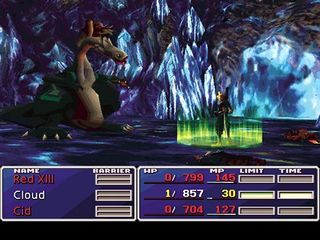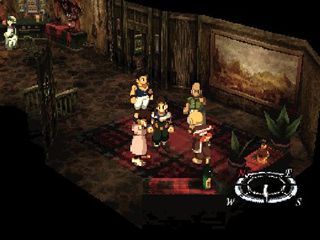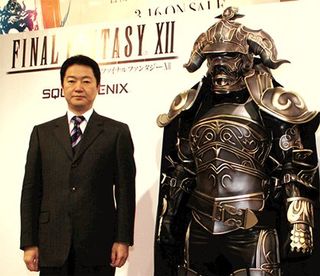Thirteen years on from FFVII’s glorious debut, Japanese RPGs are losing their luster among committed, and casual, fans alike – and, poetically, it’s Final Fantasy XIII that’s the most iconic, if polarising, symbol of the genre’s perceived stagnation. FFXIII’s critical reception has been unusually mixed, veering from Japanese games bible Famitsu’s near-perfect 39/40 to Hong Kong Magazine’s 4/10 review, in which they described it as an ‘insult’ and ‘the biggest swindle in gaming history’ because of its linearity. “It’s little more than an amusement park ride.” They said, scoring the gameplay 1 out of 10.
“The hype machine is to blame,” says RPGFan.com reviews editor Patrick Gann of the game’s mixed reception. “When I first saw the trailer for XIII, I nearly lost control of my bladder. But that was at E3 2006. If the eye candy is the best thing about this game, then Square played their trump card about four years too soon.”
Even die-hard fans are turning, condemning a loss of the values that made the series great, namely: freedom, interesting characters and challenging storylines. “Why don’t they make a 20 hour movie and save me the trouble of playing it?” says disgruntled fan OnyX on YouTube. “The battle system is too narrow. There’s little room for trying new things”, says another. While on the Final Fantasy Online forums, an entire thread is devoted to slating the game. “They’ve taken the things that make FF special, and got rid of them,” voices one poster.

Above: FFVII is still seen by many as the best RPG ever made
Once a symbol of global success, Final Fantasy is now being held to account for the wider failings of the Japanese games industry. Some of its biggest names have been outspoken about the industry’s slump. “Japan is over. We’re done. Our games industry is finished.” says Capcom’s Keiji Inafune. “The industry in Japan is a modern form of sakoku,” says Ninja Gaiden creator Tomonobu Itagaki, referencing an ancient Japanese government policy of closing its doors to and rejecting foreign culture. “There’s no point in traveling the same path Japan did 400 years ago.”
In 1997, when FFVII was released, the Japanese software market was worth 537 billion yen. But in 2009, it slumped to 326 billion. A significant drop. The decline might be linked to Japan’s reluctance to adapt, suggest industry voices, with publishers selling and re-selling barely evolved sequels to previous hit games, only to a dwindling audience. Final Fantasy is on its fourteenth chapter, while Dragon Quest is welcoming a tenth instalment. It isn’t so much the dependence on sequels, but their inability to surprise that strikes many pundits. “The developers just don’t seem interested in taking risks any more,” claims PSM3 UK’s JRPG expert Kim Richards. “Recent games like Star Ocean: The Last Hope and The Last Rebellion are all using the battle systems, the themes and the dialogue boxes from ten years ago.”

Above: Xenogears was another classic on the original PlayStation
For many Western RPG fans, the thought of another cookie-cutter adventure has little appeal. “Developers have mired the modern JRPG in unoriginality,” claims Brittany Vincent, contributor to RPGFan.com, “It’s harder to empathise with characters we’ve met a hundred times before – the shrieking, hyperactive schoolgirl (like Star Ocean’s Welch), and the quirky oddball (archetyped by robot mind reader Cait Sith in FFVII).”
“It’s hard to feign concern for imitations of worlds we liberated years earlier,“ Vincent continues, “With every new orphaned amnesiac protagonist, these universes blur into one”. Tales of Symphonia, The Last Remnant, Enchanted Arms, Star Ocean, Tales of Vesperia, Lost Odyssey, Phantasy Star – all conform to Vincent’s theory. Decent games for sure, but ones that gamers outside of their fanbases will know little about, unlike the universally popular Final Fantasy series. A key problem is a fear of change, pinpoints Square Enix’s CEO Yoichi Wada: “Internally and externally, I feel there’s an expectation for us to offer something new. I really think that the Final Fantasy team could create something completely different, but at the moment they’re strictly catering to a particular audience.”

Above: That's SquareEnix's Yoichi Wada on the left
“These days, EXP grinding – fighting hundreds of identical random battles to increase stats – make the games feel like an archaic remnant of the past,” adds Brittany Vincent, “We’re looking to recapture the magic of the ‘old days’; the giddy feeling of a world of unknown possibility opening up before you. Now many gamers see a new JRPG, and think of the toil lying in wait; the effort and time sacrifice required to get the most from it”. While its visuals have huge universal appeal, and the plot intrigues, FFXIII takes 20 or 30 hours before reaching its potential. For FFVII fans, now 13 years older, and staring at jobs, mortgages and kids, it’s a formidable obstacle.
